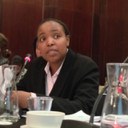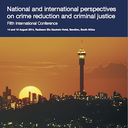Poverty, physical and sexual violence against children, were some of the key issues raised at the meeting between the South African government delegation and the African Committee of Experts on the Rights and Welfare of the Child (ACERWC) to examine South Africa’s Initial Country Report on the African Charter on the Rights and Welfare of the Child, which took place in Ethiopia on 9 October.
Community Law Centre's 2013 Annual report is now available.
There has been a gradual but consistent improvement in municipal audit outcomes over the past five financial years (2008/09-2012/13), but notwithstanding national government’s new and more realistic strategy to improving audit outcomes, local government may fall short of achieving the new targets for 2019 set by the new Minister.
A researcher for the Socio-Economic Rights Project at the Community Law Centre, Gladys Mirugi-Mukundi participated in the Lwandle Commission of Inquiry by way of presentation of a paper on mass evictions and illegal occupation of land. The paper titled: Evictions in South Africa: Relevant International Standards follows the submission made by Community Law Centre to the Lwandle Commission of Inquiry.
Results of an audit of pre-trial detention in Mozambique, carried out by Liga Moçambicana dos Direitos Humanos (the Mozambique Human Rights League) and CSPRI at the Community Law Centre of the University of the Western Cape, were presented at a seminar on 11 and 12 September 2014 in Maputo.
Results of an audit of pre-trial detention in Mozambique, carried out by Liga Moçambicana dos Direitos Humanos (the Mozambique Human Rights League) and CSPRI at the Community Law Centre of the University of the Western Cape, were presented at a seminar on 11 and 12 September 2014 in Maputo.
According to him, perhaps planning is the most important responsibility of local government. Yet, in many parts of the continent, local authorities conduct planning in terms of outdated colonial laws. These laws were written for post-war Europe and never designed to deal with specific challenges such as urbanisation, informality and environmental challenges.
Dr Aquinaldo Mandlate takes on the task of the Community Law Centre advocating for advancements in human rights in Africa. The researcher at the Children’s Rights Project of the Centre, last week, delivered expert contributions for participants attending the Oslo Diploma Course (ODC) on advanced Human Rights Training in Norway.
Community Law Centre’s researcher at the Multilevel Government Initiative Tinashe Chigwata presented on behalf of knowledge institutions at consultative workshops organised by the Ministry of Local Government, Public Works and National Housing in partnership with UNDP. The workshops were held from 27 to 28 August at Rainbow Towers Hotel in Harare.
Prof Lukas Muntingh and Gwen Dereymaeker went to Burundi from 18 to 20 August 2014 as part of the Article 5 Initiative activities. The Article 5 Initiative is a four-year project aimed at developing tools to monitor domestication of the UN Convention against Torture in 6 African countries.
Civil Society Prison Reform Initiative researchers Gwénaëlle Dereymaeker and Jean Redpath presented papers at the 2014 international conference on National and International Perspectives on Crime Reduction and Criminal Justice hosted by the Institute for Security Studies (ISS).
The aim of the fourth workshop in South Africa was to consult on the draft Plan of Action developed during the third consultations, and obtain buy-in from key represented stakeholders, while in Burundi the fourth workshop was focussed on preparing for reporting in the upcoming review of Burundi by the UN Committee against Torture. The seminars took place 8-9 on July 2014 in Cape Town, South Africa and 18-20 August 2014 in Bujumbura, Burundi.











